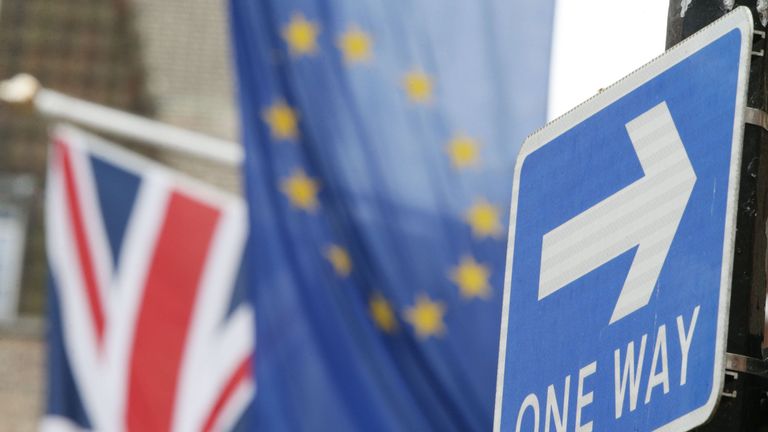Stung David Davis fires back at Brexit critics
The Cabinet Minister dismisses EU warnings on time running out as a negotiating tactic, but stresses the need for speed at home.
Sunday 3 September 2017 15:12, UK
The Brexit clock may be ticking, but according to David Davis, time is not running out. Not in Brussels at least.
Clearly stung by mounting criticisms of his negotiating strategy, the Brexit Secretary used an interview on the Andrew Marr Show to fire back at his opponents at home and abroad.
He said the idea put forward by the EU's chief negotiator last week that no progress had been made was "silly", pointing to the agreement reached on continuing access to the European Health Insurance Card for UK citizens living in the EU as his evidence.
He poured scorn too on Michel Barnier's warning that time was running out as being nothing more than a negotiating tactic to strong arm the UK into agreeing to a large Brexit divorce bill.
The suggestion there is that the EU were "trying to play time against money" - a pressure to which he vowed not to succumb.
:: EU playing 'time against money' in Brexit talks
And he dismissed as "nonsense" reports in the Sunday Times that the Government had secretly resolved to agree to a £50bn divorce settlement with the EU, to be announced after the upcoming party conference season.
But turning to the upcoming second reading of the EU Withdrawal Bill (previously known as the Great Repeal Bill), Mr Davis implied the clock was very much ticking and there was no time for messing around.
Labour has said that it will not support the Bill in its current form over concerns about so-called "Henry VIII Clauses", which would give Ministers powers to pass legislation with limited parliamentary scrutiny.
There are suggestions a number of Conservative MPs who had supported Remain are considering backing amendments Labour plan to put forward, something which could prolong, or ultimately derail the Bill's progress.
There simply is not time for that, according to Mr Davis, who said the swift passage of the Bill through Parliament was a practical necessity, even for those who want a "soft brexit".
The Bill he claimed was the only way to ensure existing laws deriving from the EU are in place in domestic UK law the day after Brexit, avoiding the much-feared "cliff edge".
Concerns that Ministers would sneak laws through out of sight of MPs, he said, were not credible, and that "everything significant" would be dealt with in the conventional parliamentary manner.
But it seems his opposite number, shadow Brexit secretary Sir Kier Starmer, is adopting a similar strategy to that employed by Mr Davis himself in Brussels - a refusal to be forced into an agreement by the threat of time pressure.
Mr Starmer said his party would not give the government a "blank cheque" on issues that would have such long-lasting impact, and that Labour's concerns must be addressed if the party is to support the bill.
Indeed, according to Mr Starmer, the time pressures are of the Government's own making because things are "going so slowly in negotiations".
That lack of progress, he says, is precisely why Labour believes the UK must remain a member of the single market and the customs union for a "transitional period" after it leaves the EU.
When pushed on how long he believed that period may last, Mr Starmer said it should be as short as possible but acknowledged it could go on more than three years, which would take it through to the next scheduled General Election.



